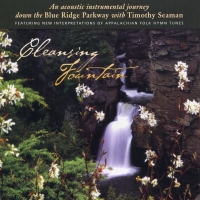|
Album Liner Notes 1. Cleansing Fountain (Words William Cowper, 1771) “There is a fountain filled with blood drawn from Immanuel’s veins.” The many fountains of the Blue Ridge spring from limestone, quartzite, and granite, tumbling over precipices such as the two Crabtree Falls (Mileposts 27 and 339)—clean water for the life around and beyond. 2. Journeying We all long for our true home; for many of us, the mountains are a homelike destination. Babel’s Streams (Words anon.) “By Babel’s streams we sat and wept as Zion we thought on.” The folk hymns are full of mountain and stream images, such as this quote from Psalm 137, worded similarly to the 1583 Day’s Psalter. Pilgrim (John Barleycorn) (Words anon.) “Come, all ye mourning pilgrims dear, who’re bound for Canaan’s land.” This widely used melody is thought to have influenced Stephen Foster’s writing. Bound for the Promised Land (Words Samuel Stennett) “On Jordan’s stormy banks I stand and cast a wishful eye.” The tune is like “I’ll Go Enlist for a Sailor,” and appears in the old books equally in major and minor keys. For Mount Mitchell, the highest peak in the eastern U.S. at 6,684 feet (Milepost 355). 3. Wondrous Love (Words anon.) “ What wondrous love is this, O my soul!” This dorian-mode masterpiece is of the “Captain Kidd” group of folksongs widely sung since the early 1700s. The arrangement here is from the shape-notes of William Walker’s Southern Harmony, 1854. A closely related tune is “Bartimeus” below. 4. Morning Trumpet (Words John Leland) “O when shall I see Jesus and reign with him above, and we hear the trumpet sound in that morning? And from the flowing fountain drink everlasting love…” This revival spiritual is akin to African American spirituals; the author is noted for presenting President Jefferson with a 1,600 lb. wheof cheese. His hymn was later a favorite of Abraham Lincoln. 5. Holy Manna (Words George Adkins) “Brethren, we have met to worship and adore the Lord our God.” This perennial favorite was first seen in William Moore’s Columbian Harmony, 1825. 6. French Broad (Words William Walker) “High o’er the hills the mountains rise.” The author wrote the words while traveling on the magnificent French Broad River (Milepost 394) in 1831. Its melody is a variant of “Kedron;” the shape notes of the “fa-so-la folk” are from The SouthernHarmony. Carolina (Words Charles Wesley) “A charge to keep I have, a God to glorify.” The tune is of the widespread “Lord Randall” group of ballads that includes America’s “The Wife of Usher’s Well” and the folk hymn “Idumea.” I am partial to these strong old folk tunes that were once joined with popular texts such as this. How the words gain force! Resignation (Words Isaac Watts) “My shepherd will supply my need: Jehovah is his name; in pastures fresh he makes me feed.” For Crabtree Meadows (Milepost 340) and Shining Rock Wilderness (Milespost 420). 7. Linville (Words Isaac Watts; music by Timothy Seaman, © 2007 Pine Wind Music, Inc.) “Upward I lift mine eyes: from God is all my aid.” Near Grandfather Mountain, Linville Falls and its gorge (Milepost 316) are a highland paradise of pounding and rushing waters. The recording engineer, Henry Smith, grew up in nearby Crossnore. 8. Bartimeus (Words anon.) “‘Mercy, O thou son of David,’ thus poor blind Bartimeus prayed.” The song is in the old ballad manner, and is found in The Sacred Harp, 1844. 9. Dulcimer (Words Joseph Swain) “His voice, as the sound of the dulcimer sweet, is heard through the valley of death.” The tune is akin to “Lord Lovell” and “The Mermaid.” Both types of dulcimer are included in this arrangement. The Blue Ridge is home to a number of fine builders of these instruments. Jefferson (Words John Newton, 1779) “Glorious things of thee are spoken, Zion, city of our God, on the rock of ages founded.” Jefferson and Boone, NC, (Milepost 299), are highland towns named for great early leaders among the settlers of the Blue Ridge. Cumberland (Words anon. & Joseph Swain) “Come, all ye happy race who are ransomed by grace.” The tune is of the “Bailiff’s Daughter” family and dates from the sixteenth century and earlier. Cumberland Knob (Milepost 218), at the state line, was the Parkway’s first recreation area and the location of the beginning of its construction in 1935. 10. Converted Thief (Words attrib. Samuel Stennett) “As on the cross the Savior hung and wept and bled and died” is an old-style ballad of the robber who asked forgiveness during his execution, with text from Mercer’s Cluster, 1817. 11. New Britain (Words John Newton) “Amazing grace (how sweet the sound) that saved a wretch like me!” The old British Isles melody was first published in Winchester, VA in Virginia Harmony, 1831, then joined with these words three years later in The Southern Harmony. 12. Virginia (Words Isaac Watts, from Psalm 89) “Thy words the raging winds control...” Salem (Words Isaac Watts) “He dies, the friend of sinners dies! Lo, Salem’s daughters weep around.” The tune is like the secular “A Brisk Young Sailor.” Salem, VA, is near Roanoke Mountain, where the Parkway has side roads to the peak and nature centers (Milepost 120); also nearby is a spur to Virginia’s Explore Park (Milepost 115). Rockbridge (Words Isaac Watts) “Life is the time to serve the Lord.” An old tune from Britain, with shape-note parts from The Southern Harmony. Rockbridge County is named for the Natural Bridge, one of the “seven natural wonders of the world,” near the highest point on the Parkway in Virginia (Milepost 77). Staunton (Words Philip Doddridge) “Awake, our souls, and bless his name!” The first settler of the Shenandoah Valley was the Scotch-Irishman John Lewis in 1732 near present-day Staunton (Milepost 0). The tune is in the “Babe of Bethlehem” group, and was in Kentucky Harmony, 1815. Peaks of Otter (Words Isaac Watts; music by Timothy Seaman, © 2007 Pine Wind Music, Inc.) From Watts’ 88-stanza interpretation of the Song of Solomon. At Milepost 86 lies a fine idyllic retreat by a lake surrounded by peaks to climb! Sharp Top was once thought to be the highest in the East. 13. Come Thou Fount of Every Blessing (Words Robert Robinson, 1758): “…tune my heart to sing thy grace; streams of blessing never ceasing…” All three of these well-known tunes are associated with this uplifting text. Nettleton is a variant of the children’s song “Go, Tell Aunt Rhody.” Beach Spring was first published in 1844 in The Sacred Harp. One of my favorite Blue Ridge features is a spring flowing out from rocks over a stream’s beach. Restoration (I Will Arise) is related to the secular tune “The Cruel Mother.” For the falls on Campbell Creek in Three Ridges Wilderness (Milepost 14). 14. Pisgah (Words Isaac Watts) “When I can read my title clear to mansions in the skies…” The melody is related to both British (“Little Musgrave and Lady Barnard”) and African American (“Lord, Remember Me”) sources. Mount Pisgah (Milepost 408), in Pisgah National Forest, is named for the peak where Moses looked across into the promised land just before his death, just as this hymn which ponders a future in heaven. How Firm a Foundation (Words Rippon’s Selection, 1787) “…ye saints of our Lord, is laid for your faith in his excellent word!” Many years ago I had the nightly privilege of singing my young daughters to sleep with this masterpiece. Lead Me to the Rock (Words anon.) “In seasons of grief to my God I’ll repair… Lead me to the rock that is higher than I.” For Humpback Rocks (Milepost 6), Rocky Knob Recreation Area (Milepost 165) and Looking Glass Rock (Milepost 412). |
| MAIN | SONG LIST | LINER NOTES | BUY MUSIC |
 Cleansing Fountain (2007)
Cleansing Fountain (2007)